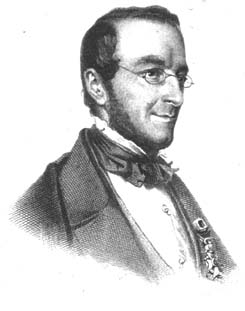André Dumont (geologist) facts for kids
André Hubert Dumont (February 15, 1809 – February 28, 1857) was a famous Belgian geologist. Geologists are scientists who study the Earth's rocks, minerals, and landforms. They help us understand how our planet was formed and how it changes over time.
Dumont was born in Liège, a city in Belgium. He became very important in the field of geology.
Contents
Early Discoveries and Teaching
André Dumont's first major work was a detailed study about the geology of the Liège area. He published this in 1832. It showed how skilled he was at understanding the Earth's structure.
A few years later, he became a professor at the University of Liège. He taught about mineralogy (the study of minerals) and geology. Later, he even became the Rector, which is like the head of the university.
Studying Belgium's Rocks
Dumont then focused on describing the different types of rocks and layers found in Belgium. He gave names to many of the rock layers from the Cretaceous and Tertiary periods. These periods are huge spans of time in Earth's history. Many of the names he chose are still used by geologists today.
His work called Mémoire sur les terrains ardennais et rhénan de l'Ardenne, du Brabant et du Condroz (published between 1847 and 1848) was special. It carefully described the minerals in the rock layers.
Mapping Europe's Geology
For twenty years, André Dumont worked hard on creating a geological map of Belgium. This map showed where different types of rocks and geological features were located across the country. He wanted his map to be as perfect as possible. To do this, he walked across almost every important area in Belgium, examining the land himself.
He also traveled to other parts of Europe, like the shores of the Bosphorus (a strait in Turkey) and the mountains of Spain. He gathered information from these trips to create an even bigger project: a geological map of Europe. This map was a huge achievement. It was one of the first serious attempts to connect the geology of different European countries on a large scale.
After Dumont passed away, his geological map was updated by Gustave Dewalque. Dewalque took over Dumont's teaching position at the university.
Awards and Legacy
In 1840, the Geological Society of London honored Dumont with the Wollaston medal. This is a very important award for geologists. André Dumont died in Liège.
His son, also named André Dumont (1847–1920), followed in his father's footsteps. On August 1, 1901, his son discovered coal in the Campine basin in Belgium.
 | Dorothy Vaughan |
 | Charles Henry Turner |
 | Hildrus Poindexter |
 | Henry Cecil McBay |



